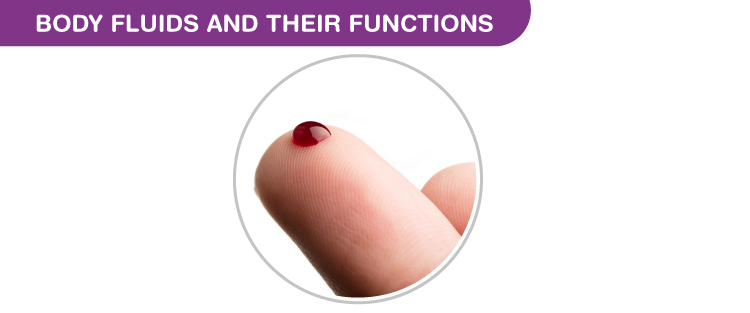Has it ever occurred to you why we cry? Do we secrete tears when we cry? Tears are one of the body’s fluids.
Have you ever felt extremely thirsty after eating a pizza? These are some of the functions that the body fluids inside the body do to maintain the water content. Body fluids help regulate body temperature, help in blood circulation, helps in digestion and keep the skin moist. Let’s explore what is body fluids and see what are the different types of fluids present in our body.
Body fluids are the fluids that originate inside the body of living beings. The fluids originate from inside the bodies. Cells consist of approximately 60-65% of body water (intracellular fluid) and another 35-40% of body water outside the cells (extracellular fluid). There are 6 to 10 litres of lymph in the body, compared to 3.5 to 5 litres of blood.
Acquese humor: It is the limpid fluid within the eyeball between the cornea and the lens.
It maintains the pressure and keeps the eyeball spherical in shape, and keeps the wall of the eyeball taut. It acts as an antioxidant agent.
Vitreous humor: It fills the back or posterior chamber of the eyeball.
Endolymph: The bodily fluid that fills the membranous part of the inner ear. It helps in stimulating reception, which translates the movement into nerve impulses that the brain perceives as sound.
Perilymph: The body fluid that fills the space between the bony labyrinth and membranous labyrinth of the inner ear.
Extracellular fluid: The body fluid that is outside the cell. They help control the movement of water and electrolyte throughout the body. To maintain osmotic balance, the extracellular parts of human beings must be able to excrete and absorb water to and from the environment. Blood flow delivers oxygen to arterioles, capillaries and venules and clears waste products of metabolism.
Intracellular fluids: The water inside the cell makes up about 40% of total body water. It contains electrons, which are element or compound that, when dissolved in fluid, breaks up into ions. There are a lot of electrolytes inside the cell, but potassium, magnesium and phosphate are higher in amount.
Besides, Intracellular and extracellular fluids help in keeping the body hydrated and helps in renal functions of the body and other important fluid functions.
Download Byju’s App to learn more and explore.

Comments